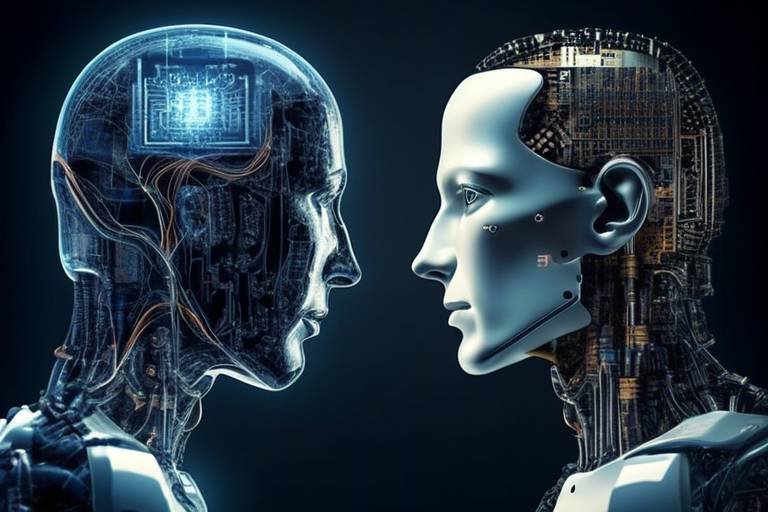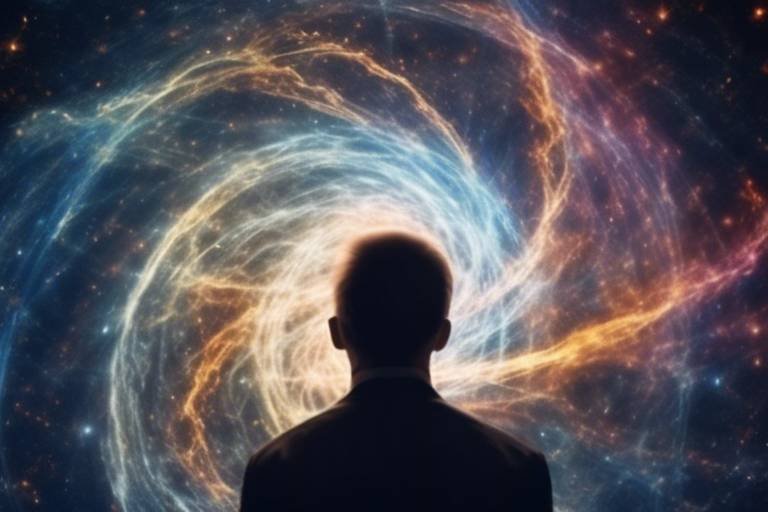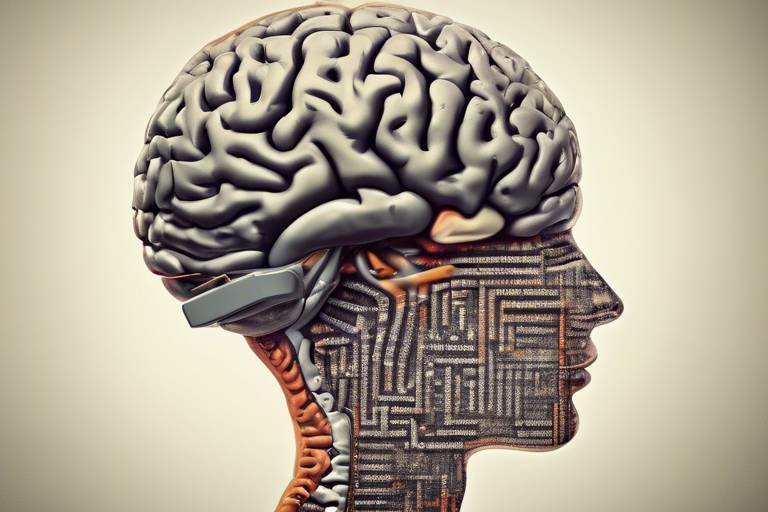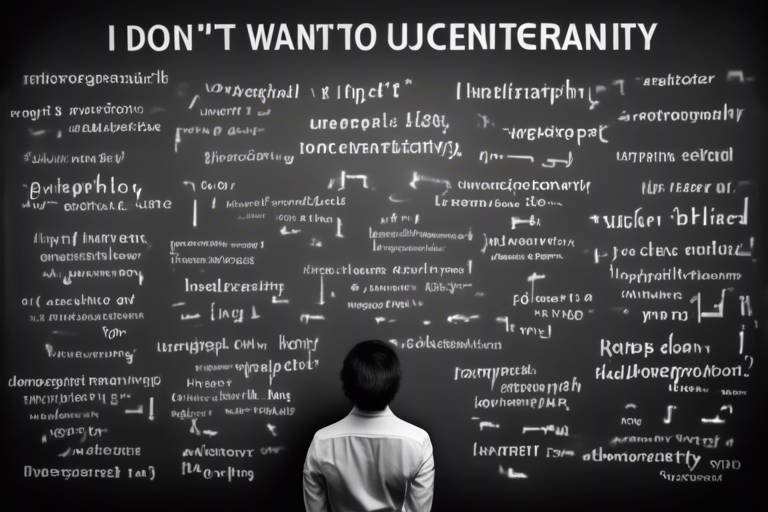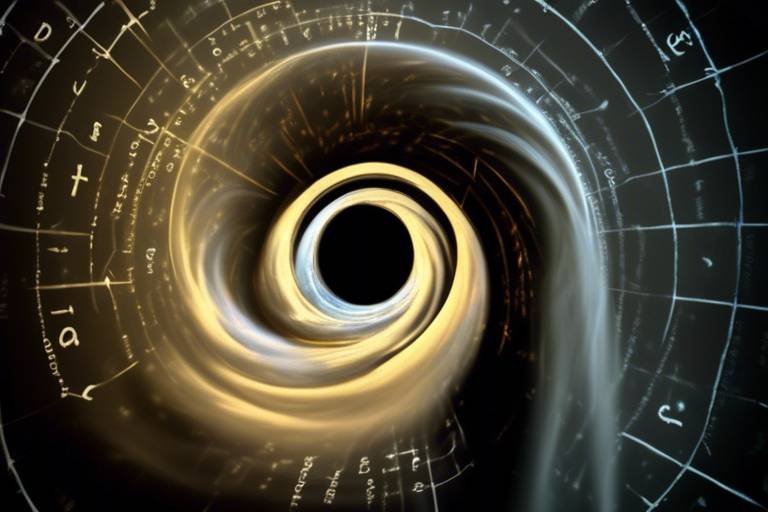The Paradoxes in Quantum Mechanics - A Philosophical Perspective
Quantum mechanics is not just a branch of physics; it’s a deep dive into the very nature of reality itself. It challenges our traditional understanding of the universe, presenting paradoxes that can leave even the most seasoned scientists scratching their heads. Imagine standing at the edge of a vast ocean, where every wave represents a different possibility, each crashing against the shore of our understanding. This article explores these intriguing paradoxes, examining their philosophical implications and how they challenge our understanding of reality, causality, and the nature of existence itself.
At its core, quantum mechanics transforms our perception of reality. Think of reality as a well-structured library filled with books of knowledge. Classical physics, the old guard, organizes these books neatly on shelves, each with a clear title and author. However, quantum mechanics throws all that into disarray. Concepts like superposition and entanglement complicate our understanding of what is truly 'real.' In the quantum realm, particles can exist in multiple states at once until observed, akin to a book that can tell multiple stories simultaneously until you open it to read. This notion challenges the very fabric of reality, forcing us to reconsider how we define existence.
The observer effect is a fascinating concept that raises profound philosophical questions. It suggests that merely observing a quantum system can alter its behavior, much like a spectator at a magic show who inadvertently influences the performance. This leads us to ponder the role of consciousness in shaping reality. Are we mere observers, or do our thoughts and intentions play a role in the unfolding of the universe? The implications are staggering: if our consciousness can influence reality, what does that say about our existence and our place in the cosmos?
The measurement problem in quantum mechanics highlights the difficulties in defining when and how quantum systems transition from potential states to actual outcomes. It's like trying to catch a shadow—elusive and ever-changing. This raises fundamental questions about determinism and randomness in the universe. Are events predetermined, or do they unfold randomly? As we grapple with these questions, we find ourselves at a crossroads, where science and philosophy intersect.
One of the most intriguing concepts in quantum mechanics is the wave function collapse. When a quantum system is measured, its wave function collapses into a single state, much like a magician revealing the final trick. This leads to fierce debates about the nature of reality and the role of the observer. Does reality exist independently of our observation, or is it intrinsically linked to our consciousness? This question is not just academic; it touches on the very essence of what it means to exist.
Enter the Many-Worlds Interpretation, a mind-bending theory that suggests all possible outcomes of quantum measurements occur in separate, branching universes. Imagine a tree with countless branches, each representing a different reality. This interpretation challenges traditional views of reality, suggesting a multiverse teeming with infinite possibilities. It invites us to consider the implications of our choices and the myriad paths our lives could take in alternate realities.
Entanglement reveals a profound interconnectedness within the universe. Particles can instantaneously affect each other, regardless of the distance separating them, much like a pair of dancers perfectly in sync, no matter how far apart they are. This phenomenon raises questions about the nature of space and time, challenging our conventional understanding of causality. If particles can communicate faster than light, what does that mean for our understanding of the universe?
The tension between quantum mechanics and the philosophical debate on determinism is palpable. Does the inherent randomness of quantum events allow for genuine free will in a seemingly chaotic universe? It’s a question that has puzzled philosophers for centuries. Chaos theory provides insight into how small changes in initial conditions can lead to vastly different outcomes, paralleling quantum mechanics in its implications for predictability and control in complex systems. This interplay raises critical questions about our moral responsibility and the nature of choice.
As we analyze the broader philosophical implications of quantum mechanics, we find ourselves reconsidering fundamental concepts such as free will, moral responsibility, and the nature of existence. Are we truly in control of our destinies, or are we merely passengers in a universe governed by chance? These inquiries invite us to reflect on our understanding of existence itself, urging us to explore the depths of our consciousness and the nature of reality.
In conclusion, the paradoxes of quantum mechanics not only enhance our scientific understanding but also invite profound philosophical inquiries. They bridge the gap between empirical evidence and metaphysical speculation, prompting us to reconsider our place in the universe. As we navigate through the complexities of quantum mechanics, we are reminded that the pursuit of knowledge is not just a scientific endeavor but a deeply philosophical journey.
- What is quantum mechanics? Quantum mechanics is the branch of physics that deals with the behavior of very small particles, like atoms and photons, and their interactions.
- What is the observer effect? The observer effect refers to changes that the act of observation can make on a quantum system.
- What is wave function collapse? Wave function collapse is the process by which a quantum system transitions from multiple possibilities to a single outcome upon measurement.
- What is the Many-Worlds Interpretation? This interpretation suggests that all possible outcomes of quantum measurements exist in separate, parallel universes.
- How does quantum mechanics relate to free will? Quantum mechanics introduces randomness, which raises questions about whether our choices are predetermined or genuinely free.

The Nature of Reality
When we dive into the depths of quantum mechanics, we find ourselves in a realm that challenges our most fundamental beliefs about reality. Imagine standing at the edge of a vast ocean, where each wave represents a different possibility, and the shore symbolizes the reality we perceive. In this ocean, concepts like superposition and entanglement emerge, reshaping our understanding of what is truly 'real.' Gone are the days when we could confidently say that an object is either here or there; quantum mechanics introduces a fluidity to existence that can be both exhilarating and perplexing.
At its core, superposition suggests that particles can exist in multiple states at once, much like a musician playing several notes simultaneously before resolving to a single harmonious chord. This means that until we observe a particle, it can be in a state of flux, embodying various possibilities. This idea forces us to ask: if reality is not a fixed entity, but rather a collection of potentialities, what does that mean for our experience of the world around us?
Moreover, entanglement introduces a captivating twist to our understanding of reality. Picture two dancers, perfectly synchronized, no matter how far apart they are. In the quantum world, entangled particles behave as if they are connected by an invisible thread, influencing each other instantaneously, regardless of distance. This phenomenon challenges our traditional notions of space and time, suggesting that the universe is far more interconnected than we once believed.
As we explore these concepts, we must confront the philosophical implications they carry. If reality is not a straightforward narrative but a complex tapestry woven from probabilities, how do we define existence itself? Are we mere observers in a grand cosmic play, or do we hold the power to shape reality through our consciousness? These questions echo through the corridors of philosophy and science, inviting us to reconsider our place in the universe.
To further illustrate these ideas, consider the following table that summarizes the key concepts of quantum mechanics that challenge our understanding of reality:
| Concept | Description |
|---|---|
| Superposition | The ability of a particle to exist in multiple states simultaneously until measured. |
| Entanglement | A phenomenon where particles become interconnected, influencing each other instantaneously over distances. |
| Wave Function | A mathematical description of the quantum state of a system, representing probabilities of finding a particle in various states. |
In conclusion, the nature of reality as presented by quantum mechanics is not just a scientific curiosity; it is a profound invitation to explore the very fabric of existence. As we grapple with these paradoxes, we may find that the answers lie not only in the equations of physics but also in the philosophical questions that arise from them. Are we ready to embrace this new understanding of reality, one that is dynamic, interconnected, and fundamentally mysterious?
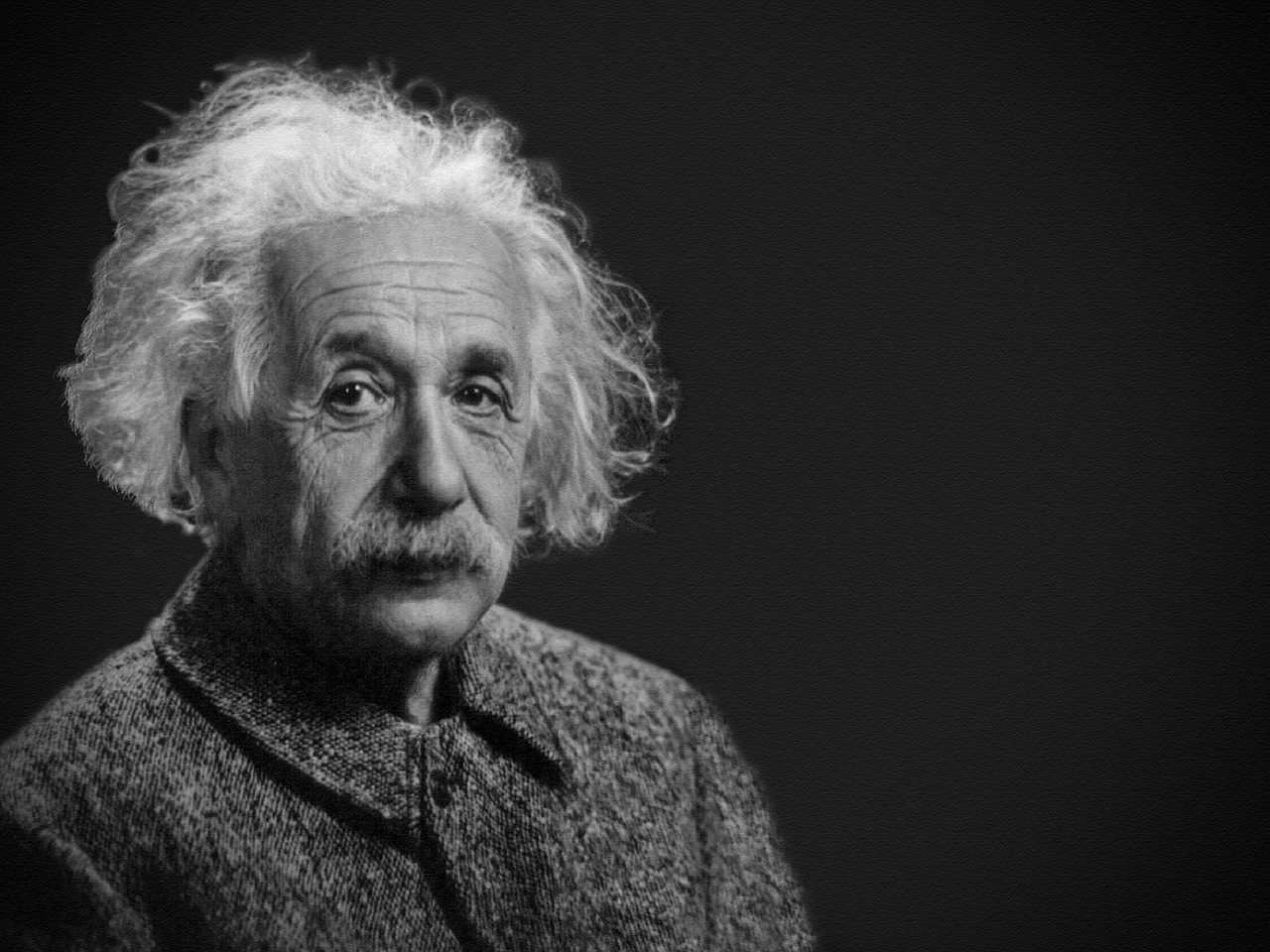
Observer Effect
The in quantum mechanics is one of those mind-bending concepts that makes you question everything you thought you knew about reality. Imagine for a moment that you're peering into a crystal ball, trying to catch a glimpse of the future. The moment you take a look, the future you were about to see changes. This is somewhat akin to what happens in quantum mechanics when we observe particles. It's not just that we are looking; our very act of observation influences the behavior of these particles. This raises a plethora of philosophical questions: Does our consciousness play a role in shaping reality? Are we mere spectators in a grand cosmic play, or do we have a hand in writing the script?
To understand the observer effect, we need to dive into the nature of quantum systems. In classical physics, an object's properties exist independently of observation. A ball is a ball, whether you’re looking at it or not. However, in the quantum realm, things get a little wobbly. Particles can exist in a state of superposition, meaning they can be in multiple states at once until measured. When we observe them, they 'choose' a state, collapsing into a specific outcome. This phenomenon leads to an intriguing question: Are we creating reality with our observations, or merely discovering it?
This effect can be illustrated with a simple table that contrasts classical and quantum mechanics:
| Aspect | Classical Mechanics | Quantum Mechanics |
|---|---|---|
| State of Objects | Exist independently of observation | Exist in superposition until observed |
| Measurement | Does not affect the state | Collapses the wave function |
| Determinism | Predictable outcomes | Inherently probabilistic |
When we talk about the observer effect, we also can't ignore the implications it has on our understanding of consciousness. Some philosophers argue that if our observation can change the outcome of an event, then consciousness itself must have a fundamental role in the fabric of reality. This perspective leads us to ponder whether the universe is a stage where we are all active participants, or if we are simply observers in a deterministic play.
Furthermore, the observer effect has sparked debates among scientists and philosophers alike. Some suggest that consciousness is a prerequisite for the collapse of the wave function, while others argue that the act of measurement, regardless of consciousness, is what leads to a definitive state. This divide creates a fascinating dialogue on the nature of existence and our place within it.
In essence, the observer effect not only challenges our understanding of physics but also invites us to explore deeper philosophical questions about the nature of reality, existence, and the role of human consciousness. It’s a reminder that the universe is far more complex and mysterious than we can ever truly comprehend. So the next time you find yourself observing something, remember: you might just be changing it.

Measurement Problem
The measurement problem in quantum mechanics is one of the most perplexing and debated topics in modern physics. At its core, it revolves around a fundamental question: when does a quantum system transition from a state of potentiality to a state of actuality? Imagine you're flipping a coin; while it's spinning in the air, it can be considered to be in a superposition of both heads and tails. However, as soon as you catch it, it 'chooses' one outcome. This dilemma raises profound philosophical questions about the nature of reality itself and how we perceive it.
To delve deeper, we must consider the implications of this transition. The measurement problem suggests that the act of measuring a quantum system plays a crucial role in determining its state. This leads us to ponder whether reality exists independently of our observation or if it is, in some way, dependent on the observer. In classical physics, objects have defined states regardless of observation, but quantum mechanics challenges this notion. It introduces a world where particles exist in a haze of probabilities until measured, which can be quite unsettling.
One of the most fascinating aspects of the measurement problem is its relationship with determinism and randomness. Traditional views of the universe often lean towards a deterministic framework, where every event or state is a direct consequence of preceding states. However, quantum mechanics throws a wrench into that idea. The randomness inherent in quantum measurements suggests that outcomes are not predetermined but rather probabilistic. This unpredictability can be likened to a game of chance, where you can never be entirely sure of the outcome until the dice are rolled.
To illustrate this further, consider the following table that summarizes key concepts related to the measurement problem:
| Concept | Description |
|---|---|
| Superposition | The ability of a quantum system to exist in multiple states simultaneously until measured. |
| Wave Function | A mathematical description of the quantum state of a system, representing probabilities of outcomes. |
| Collapse | The process by which a wave function reduces to a single outcome upon measurement. |
| Observer Effect | The phenomenon where the act of observation alters the state of the quantum system. |
Ultimately, the measurement problem challenges our understanding of reality and invites us to reconsider the relationship between observer and observed. It raises questions about the nature of existence itself: Is reality a fixed entity, or is it fluid and shaped by our consciousness? As we grapple with these ideas, we find ourselves at the intersection of science and philosophy, where the boundaries of knowledge blur and new possibilities emerge.
As we explore the measurement problem further, it becomes evident that the implications extend beyond physics. They touch upon our understanding of free will, the nature of existence, and the very fabric of reality. The more we probe these questions, the more we realize that the universe is not merely a collection of objects and events but a complex tapestry woven with threads of uncertainty and potentiality.
- What is the measurement problem? The measurement problem refers to the challenge of understanding how and when a quantum system transitions from a state of superposition to a definite state upon measurement.
- How does the measurement problem relate to reality? It raises questions about whether reality exists independently of observation or if it is influenced by the act of measurement.
- What are the implications of the measurement problem for free will? The randomness inherent in quantum mechanics suggests that not everything is predetermined, inviting discussions about the nature of free will.

Wave Function Collapse
The concept of is one of the most fascinating and perplexing elements in quantum mechanics. Imagine a world where possibilities exist in a delicate dance, swirling around like leaves in the wind. Until we take a closer look, these leaves remain in a state of potential, each one representing a different outcome. This is akin to the wave function, which encapsulates all possible states of a quantum system. However, the moment we attempt to observe or measure this system, something remarkable happens: the wave function collapses into a single state. This transition from possibility to reality raises profound questions about the nature of existence itself.
To understand wave function collapse, let's consider a classic example: Schrödinger's cat. In this thought experiment, a cat is placed in a sealed box with a radioactive atom that may or may not decay. Until someone opens the box to check, the cat is simultaneously alive and dead, existing in a superposition of states. It is only when an observer interacts with the system—by opening the box—that the wave function collapses, and the cat is either alive or dead. This scenario illustrates the paradox of quantum mechanics where observation plays a crucial role in determining reality.
But what does this mean for our understanding of the universe? The implications are staggering. If the act of measurement influences the outcome, it suggests that reality is not as objective as we once thought. Instead, it hints at a universe that is deeply intertwined with the consciousness of observers. Are we merely passive witnesses to a pre-existing reality, or do we play an active role in shaping it? These questions challenge our traditional views and force us to reconsider the relationship between the observer and the observed.
Moreover, the concept of wave function collapse also ties into the broader philosophical discussions surrounding determinism and randomness. If the universe operates on probabilities rather than certainties, then the very fabric of reality becomes a tapestry woven with uncertainty. This leads us to ponder whether our actions are truly our own or if they are simply the result of a series of random events.
In summary, wave function collapse serves as a gateway into the intriguing world of quantum mechanics, inviting us to explore the depths of reality and existence. It challenges our perceptions and urges us to question the very nature of consciousness and the universe. As we delve deeper into these paradoxes, we find ourselves standing at the crossroads of science and philosophy, where the mysteries of existence await our inquiry.
- What is wave function collapse?
Wave function collapse refers to the process by which a quantum system transitions from a superposition of multiple possible states to a single, definitive state upon measurement or observation.
- How does wave function collapse relate to Schrödinger's cat?
In Schrödinger's cat thought experiment, the cat exists in a superposition of being both alive and dead until an observer opens the box, causing the wave function to collapse to one of the two states.
- What are the philosophical implications of wave function collapse?
The wave function collapse raises questions about the role of the observer in shaping reality, the nature of consciousness, and the fundamental randomness of the universe.

Many-Worlds Interpretation
The Many-Worlds Interpretation (MWI) of quantum mechanics is a fascinating and somewhat mind-boggling concept that challenges our traditional understanding of reality. Imagine a universe where every possible outcome of every event occurs, but in separate, branching realities. This interpretation suggests that rather than collapsing into a single outcome when measured, a quantum system exists in all possible states simultaneously, each in its own universe. It’s like a cosmic tree, with each branch representing a different reality. When a quantum event occurs, instead of choosing one branch, the universe splits, allowing all branches to coexist.
One of the most striking implications of MWI is the notion of an infinite multiverse. In this multiverse, every decision you make creates a new universe where you made a different choice. For instance, if you decide to have coffee instead of tea, there exists a universe where you chose tea. This leads to profound questions about identity and existence: if there are countless versions of you in different realities, which one is the 'real' you? The philosophical ramifications are staggering, as they challenge our notions of individuality and choice.
Furthermore, MWI circumvents some of the perplexing issues found in traditional interpretations of quantum mechanics. For example, instead of grappling with the peculiarities of wave function collapse, MWI simply states that all outcomes are realized, thus removing the need for a measurement-induced collapse. This perspective can be liberating, as it suggests that nothing is truly lost; every possible outcome continues to exist in a different universe. However, it also raises significant questions about the nature of probability and our understanding of chance. If all outcomes occur, what does it mean for events that we perceive as random?
Critics of the Many-Worlds Interpretation argue that it is overly extravagant and lacks empirical evidence. After all, how can we test the existence of these parallel universes? Some physicists contend that MWI is more of a philosophical stance than a scientific theory, as it does not offer predictions that differ from other interpretations. Yet, proponents argue that the elegance and simplicity of MWI make it a compelling framework for understanding quantum phenomena. They assert that just because we cannot observe these other realities does not mean they do not exist.
In summary, the Many-Worlds Interpretation invites us to reconsider our understanding of reality, existence, and choice. It opens up a realm of possibilities that stretches the imagination, suggesting that our universe is but one of countless realities, each unfolding in its own unique way. As we delve deeper into the quantum realm, the implications of MWI challenge us to think beyond the confines of our singular experience, prompting profound philosophical questions about the nature of existence itself.
- What is the Many-Worlds Interpretation?
The Many-Worlds Interpretation posits that all possible outcomes of quantum measurements actually occur in separate, branching universes. - How does MWI differ from other interpretations of quantum mechanics?
Unlike traditional interpretations that involve wave function collapse, MWI suggests that all outcomes exist simultaneously in a multiverse. - Can we observe other universes?
Currently, there is no empirical evidence or method to observe these parallel universes, making MWI more of a theoretical framework. - What are the philosophical implications of MWI?
MWI challenges our understanding of identity, choice, and reality, suggesting that every decision creates a new universe.

Entanglement and Non-Locality
When we dive into the fascinating world of quantum mechanics, one of the most mind-boggling concepts we encounter is entanglement. Imagine two particles that are so deeply intertwined that the state of one instantly influences the state of the other, no matter how far apart they are. This phenomenon, known as non-locality, defies our conventional understanding of space and time. It’s as if these particles are engaged in a cosmic dance, where they can communicate instantaneously across vast distances—like a pair of synchronized swimmers performing their routine, regardless of the ocean that separates them.
Entanglement challenges our traditional notions of causality and locality, which assert that objects can only influence each other through direct contact or within a limited range. Yet, experiments have shown that entangled particles behave as if they are connected by an invisible thread, leading to the conclusion that information can travel faster than the speed of light. This revelation not only raises eyebrows in the scientific community but also ignites philosophical debates about the very fabric of reality. Are we to accept that our universe is more interconnected than we previously thought, or do we need to rethink our understanding of what it means to be 'local'?
To illustrate the implications of entanglement, consider the following table, which outlines some key aspects of this phenomenon:
| Aspect | Description |
|---|---|
| Definition | Entanglement is a quantum phenomenon where particles become interconnected, such that the state of one particle instantly influences the state of another. |
| Non-Locality | Entangled particles can affect each other's states regardless of the distance separating them, defying classical notions of locality. |
| Applications | Entanglement has potential applications in quantum computing, cryptography, and teleportation, revolutionizing technology as we know it. |
The implications of entanglement extend beyond the realm of physics and into the philosophical domain. It invites us to ponder profound questions: What does it mean for our understanding of the universe if particles can influence one another instantaneously? Does this suggest a deeper connection between all things, hinting at a unified fabric of existence? Or does it challenge our very notion of individuality, as we realize that particles can no longer be seen as isolated entities?
As we explore the depths of entanglement and non-locality, we find ourselves at the intersection of science and philosophy, where the boundaries of knowledge blur and new questions emerge. This intricate web of connections not only reshapes our understanding of quantum mechanics but also invites us to reconsider our place in the universe. Are we merely observers in a vast, disconnected cosmos, or are we part of an intricate tapestry where every thread is interwoven with another?
- What is quantum entanglement?
Quantum entanglement refers to a phenomenon where two or more particles become linked, such that the state of one particle instantly influences the state of the other, regardless of the distance between them. - How does entanglement challenge classical physics?
Entanglement defies classical physics by suggesting that information can travel faster than light and that particles can be interconnected without any physical connection. - What are the implications of non-locality?
Non-locality implies that the universe is more interconnected than previously thought, raising questions about the nature of reality and the limits of our understanding of space and time.

Determinism vs. Free Will
The debate between determinism and free will is one of the most profound philosophical conundrums that arises from the implications of quantum mechanics. At its core, determinism suggests that every event or state of affairs, including human actions, is the outcome of preceding events in accordance with the natural laws. This view paints a picture of a universe that is entirely predictable, where the future is merely an extension of the past. On the other hand, the notion of free will posits that individuals can make choices independent of deterministic constraints, allowing for genuine agency and moral responsibility. This clash becomes particularly interesting when we consider the inherent randomness introduced by quantum mechanics.
In the quantum realm, events do not always follow a predictable pattern. For instance, the behavior of particles can seem to be influenced by chance rather than a strict causal chain. This unpredictability raises the tantalizing question: does this randomness provide a loophole for free will to exist? If our decisions are not predetermined but rather influenced by probabilistic events at the quantum level, then perhaps we have more control over our choices than previously thought.
However, this perspective isn't without its complications. Imagine a scenario where you decide to have coffee over tea. Is that choice a product of your conscious deliberation, or is it simply a result of quantum fluctuations occurring in your brain? This is where the philosophical implications deepen. If our thoughts and decisions are influenced by quantum randomness, can we truly claim ownership of our choices? Or are we merely puppets dancing to the tune of quantum events beyond our control?
To further explore this tension, consider the following points:
- Quantum Indeterminacy: The very nature of quantum mechanics suggests that not all events are predetermined, which opens a door to the possibility of free will.
- Neuroscience and Decision Making: Studies in neuroscience indicate that our brain processes decisions before we are consciously aware of them, challenging the notion of free will.
- Philosophical Perspectives: Different philosophical schools, such as compatibilism, argue that free will can coexist with determinism, suggesting a nuanced understanding of both concepts.
In essence, the dialogue between determinism and free will in the context of quantum mechanics is not merely an academic exercise; it has real implications for how we view ourselves and our place in the universe. Are we the architects of our destinies, or are we simply navigating a path laid out by the intricate dance of particles? As we delve deeper into these questions, we find ourselves at the intersection of science and philosophy, where each discipline informs and challenges the other.
Ultimately, this exploration invites us to reconsider our understanding of existence itself. The paradoxes of quantum mechanics not only enrich our scientific knowledge but also compel us to engage with the deeper questions of who we are and how we relate to the cosmos.
- What is determinism? Determinism is the philosophical belief that every event or action is determined by preceding events in accordance with the laws of nature.
- Can free will exist in a deterministic universe? This is a matter of ongoing philosophical debate. Some argue that free will can coexist with determinism, while others believe that true free will cannot exist if all actions are predetermined.
- How does quantum mechanics challenge determinism? Quantum mechanics introduces elements of randomness and unpredictability, suggesting that not all events are predetermined, which raises questions about the nature of free will.

Chaos Theory
Chaos theory is a fascinating branch of mathematics and science that explores how small variations in initial conditions can lead to dramatically different outcomes. Imagine the flutter of a butterfly's wings in Brazil setting off a tornado in Texas; this is often cited as a metaphor for chaos theory, illustrating how interconnected and sensitive our universe can be. In the realm of quantum mechanics, chaos theory resonates deeply, as both fields challenge our ability to predict and control the future.
At its core, chaos theory emphasizes the idea of sensitivity to initial conditions. This means that even the tiniest change can lead to a completely different trajectory, making long-term predictions nearly impossible. This unpredictability mirrors some aspects of quantum mechanics, where particles exist in a state of probability until they are measured. The parallels between chaos theory and quantum mechanics raise intriguing questions about our ability to understand and navigate the complexities of existence.
One of the most compelling aspects of chaos theory is its implications for determinism. In a deterministic universe, every event is the result of preceding events, suggesting a predictable future. However, chaos theory introduces an element of randomness and unpredictability that challenges this notion. It forces us to reconsider whether our actions and decisions are truly free or if they are merely outcomes of a complex web of prior conditions and influences.
To illustrate the principles of chaos theory, consider the following key concepts:
- Nonlinearity: Many systems in nature are nonlinear, meaning that the relationship between variables is not proportional. This nonlinearity can lead to unexpected outcomes.
- Fractals: Chaos theory often reveals patterns that are self-similar at different scales, known as fractals. These patterns can be found in nature, from coastlines to snowflakes.
- Strange Attractors: In chaotic systems, strange attractors can emerge, representing a set of states toward which a system tends to evolve, despite the unpredictability of its path.
These principles highlight how chaos theory serves as a bridge between the predictable and the unpredictable, much like quantum mechanics. Both fields challenge our traditional understanding of cause and effect, suggesting that the universe is far more complex than we often perceive. As we delve deeper into these theories, we begin to realize that our understanding of reality might be a tapestry woven from both deterministic patterns and chaotic threads.
In summary, chaos theory not only enriches our understanding of quantum mechanics but also compels us to confront the philosophical implications of a universe that is both orderly and chaotic. It invites us to ponder the nature of free will, control, and the very fabric of existence itself. As we explore these concepts further, we find ourselves grappling with profound questions about our place in a universe that is as unpredictable as it is beautiful.
- What is chaos theory? Chaos theory is the study of how small changes in initial conditions can lead to vastly different outcomes in complex systems.
- How does chaos theory relate to quantum mechanics? Both chaos theory and quantum mechanics emphasize unpredictability and the limits of our ability to predict future events.
- Can chaos theory be applied to real-world situations? Yes, chaos theory has applications in various fields, including meteorology, economics, and biology, where complex systems are common.

Philosophical Implications
The philosophical implications of quantum mechanics are as profound as they are perplexing. As we dive deeper into the quantum realm, we encounter a myriad of questions that challenge our traditional understanding of existence, morality, and free will. At the core of these inquiries is the realization that the universe operates on principles that defy our everyday experiences. For instance, the very nature of reality appears to be fluid, shifting under the weight of observation and measurement. This leads us to ponder: if reality is not fixed, what does that mean for our understanding of truth?
One of the most striking implications of quantum mechanics is its challenge to the notion of determinism. In classical physics, the universe is seen as a predictable machine, where every action has a corresponding reaction, governed by strict laws. However, quantum mechanics introduces an element of randomness that suggests not everything is predetermined. This raises an intriguing question: if quantum randomness exists, does it create a space for genuine free will? Can we truly be held morally responsible for our actions if the universe is, at its core, chaotic and unpredictable?
Additionally, the concept of entanglement further complicates our philosophical landscape. When particles become entangled, they remain connected regardless of the distance separating them. This phenomenon suggests a level of interconnectedness that challenges our understanding of individuality and separateness. Are we, in some way, all part of a larger tapestry of existence? If so, how does this affect our moral responsibilities towards one another? The implications of such interconnectedness can be both liberating and daunting, as they compel us to rethink our relationships with others and the universe.
To illustrate some of these philosophical dilemmas, consider the following table that summarizes key philosophical questions raised by quantum mechanics:
| Concept | Philosophical Question |
|---|---|
| Reality | What is the nature of reality if it can change based on observation? |
| Determinism | Does quantum randomness allow for free will? |
| Entanglement | How does interconnectedness affect moral responsibility? |
| Measurement Problem | When does potential become actual, and how does this relate to existence? |
These questions invite us to reconsider not just the scientific principles at play, but also the very fabric of our philosophical beliefs. The more we learn about quantum mechanics, the more we realize that our understanding of existence is not just a scientific endeavor but a deeply philosophical one. The interplay between science and philosophy becomes evident, as both fields seek to uncover the mysteries of our universe.
In essence, the philosophical implications of quantum mechanics urge us to embrace uncertainty and complexity. They challenge us to accept that our understanding of reality may never be complete and that questions of existence, morality, and free will may not have definitive answers. Instead, they invite us to explore the vastness of possibility, encouraging a mindset that is open to continual inquiry and reflection. As we navigate this intricate web of ideas, we find ourselves at the intersection of science and philosophy, where the mysteries of the universe beckon us to delve deeper into the nature of our own existence.
- What is the observer effect in quantum mechanics? - The observer effect refers to the phenomenon where the act of observing a quantum system alters its state, leading to questions about the role of consciousness in shaping reality.
- What is wave function collapse? - Wave function collapse is the process by which a quantum system transitions from a superposition of states to a single outcome upon measurement.
- How does entanglement challenge our understanding of space and time? - Entanglement suggests that particles can be instantaneously connected regardless of distance, which raises questions about the nature of space and our perception of time.
- Can quantum mechanics coexist with free will? - The randomness inherent in quantum mechanics opens up the possibility for free will, challenging traditional deterministic views of the universe.

Conclusion: Bridging Science and Philosophy
As we journey through the intricate landscape of quantum mechanics, we find ourselves at the intersection of science and philosophy, where the boundaries of our understanding are continually challenged. The paradoxes inherent in quantum mechanics, such as wave function collapse and entanglement, compel us to reconsider our traditional notions of reality and existence. This is not merely an academic exercise; it resonates deeply with our everyday experiences and beliefs. For instance, when we ponder the nature of reality, we are not just engaging in abstract thought; we are exploring the very fabric of our being and our place in the universe.
Moreover, the implications of quantum mechanics extend beyond the realm of physics. They invite us to reflect on profound philosophical questions, such as: What does it mean to observe something? Does our consciousness play a role in shaping reality? As we grapple with these questions, we realize that the act of observing a quantum system is not just a passive endeavor; it is an active participation in the unfolding of reality itself. This realization can be both exhilarating and unsettling, as it suggests that our understanding of existence is far more complex than we previously imagined.
To further illustrate this connection between science and philosophy, consider the following points:
- Interconnectedness: Quantum entanglement demonstrates that particles can be linked across vast distances, suggesting a profound interconnectedness in the universe that challenges our conventional understanding of space and time.
- Free Will vs. Determinism: The randomness inherent in quantum events raises questions about free will, prompting us to ask whether our choices are genuinely free or merely the result of deterministic processes.
- Moral Responsibility: If our actions are influenced by quantum randomness, how does this affect our notions of accountability and moral responsibility?
In conclusion, the paradoxes of quantum mechanics serve as a reminder that science and philosophy are not separate entities but rather intertwined disciplines that enrich our understanding of the universe. They challenge us to think critically about what we know and how we know it, urging us to embrace uncertainty and complexity. As we continue to explore these mysteries, we find that the questions they raise are as important as the answers we seek, bridging the gap between empirical evidence and metaphysical speculation.
- What is quantum mechanics? Quantum mechanics is a fundamental theory in physics that describes the behavior of matter and energy at the smallest scales, such as atoms and subatomic particles.
- What is the observer effect? The observer effect refers to the phenomenon where the act of observing a quantum system changes its state, highlighting the role of consciousness in shaping reality.
- What is the Many-Worlds Interpretation? The Many-Worlds Interpretation suggests that all possible outcomes of quantum measurements occur in separate, branching universes, leading to a multiverse of infinite possibilities.
- How does quantum mechanics relate to free will? Quantum mechanics introduces elements of randomness, prompting philosophical debates about whether this randomness allows for genuine free will or if our actions are predetermined.
Frequently Asked Questions
- What is the observer effect in quantum mechanics?
The observer effect refers to the phenomenon where the act of observing a quantum system can change its state. This means that merely looking at a particle can influence its behavior, which raises fascinating questions about the role of consciousness and the nature of reality itself. It's like trying to catch a glimpse of a shy animal in the wild; your presence can alter its natural behavior!
- How does quantum mechanics challenge our understanding of reality?
Quantum mechanics introduces concepts like superposition and entanglement, which challenge traditional views of reality. Superposition suggests that particles can exist in multiple states at once until measured, while entanglement implies that particles can be interconnected regardless of distance. This redefines what we consider 'real' and complicates our understanding of existence.
- What is the measurement problem in quantum mechanics?
The measurement problem refers to the difficulty in determining when and how a quantum system transitions from a state of potentiality to an actual state upon measurement. This raises profound questions about determinism and randomness in the universe, prompting debates about whether the universe is fundamentally predictable or if it allows for genuine randomness.
- Can you explain wave function collapse?
Wave function collapse is the process that occurs when a quantum system's wave function, which represents all possible states, reduces to a single state upon measurement. This concept leads to intriguing discussions about the nature of reality and the observer's role in shaping outcomes, similar to how a magician's reveal changes the perception of their trick.
- What is the Many-Worlds Interpretation?
The Many-Worlds Interpretation posits that all possible outcomes of quantum measurements actually occur, each in its own separate universe. This idea challenges our conventional understanding of reality and suggests an infinite multiverse where every possibility is realized, akin to a branching tree of choices and realities.
- How does entanglement affect our understanding of space and time?
Entanglement shows that particles can instantaneously affect each other, regardless of the distance separating them. This phenomenon suggests a deep interconnectedness in the universe, challenging our classical notions of space and time. Imagine two dancers moving in sync, even when miles apart; their connection defies the limitations of distance!
- What is the relationship between quantum mechanics and free will?
The tension between quantum mechanics and the philosophical debate on free will revolves around whether quantum randomness allows for genuine choice in a seemingly chaotic universe. If events can occur randomly at the quantum level, could this randomness provide a framework for free will, or does it simply add to the complexity of determinism?
- How does chaos theory relate to quantum mechanics?
Chaos theory reveals how small changes in initial conditions can lead to vastly different outcomes, paralleling the unpredictability found in quantum mechanics. Both fields highlight the limitations of predictability and control, suggesting that the universe is more complex and intertwined than we often realize, much like a butterfly flapping its wings causing a distant storm!
- What are the philosophical implications of quantum mechanics?
The philosophical implications of quantum mechanics invite us to reconsider concepts like free will, moral responsibility, and the nature of existence. As we explore these paradoxes, we are prompted to reflect on our understanding of reality and our place within it, bridging the gap between science and philosophy.






